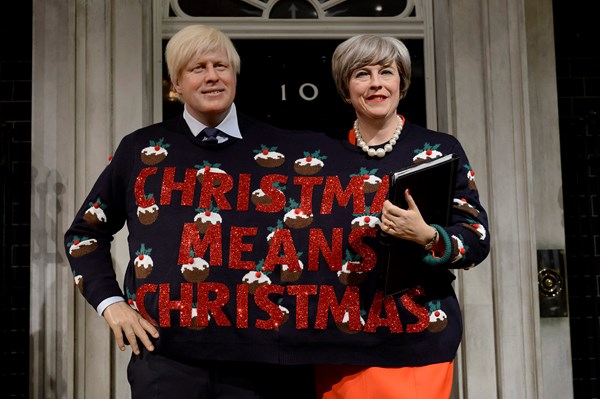
To cancel Christmas would be “inhuman” declared Boris Johnson before the nation in mid-December.
He has not attempted to rescue other religious festivals, such as Diwali, Eid and Hannukah, from coronavirus with such fervour. Nevertheless, the Prime Minister was forced to renege on his promise of a five-day window for socialising around Christmas, easing restrictions for just one day instead.
This raises the question: does the fact that coronavirus measures were loosened for Christmas day indicate a Christian bias in the government’s handling of the virus?
Until the end, Johnson was adamant that restrictions would be lifted for a five-day period, despite the warnings of his scientific advisors. However, in doing his utmost not to appear like ‘the Grinch’, he inadvertently offended members of other religions by telling them that their festivals are less important.
In his words, he announced the government’s U-turn with a “heavy heart” on 19 December, with tighter restrictions coming into force across the country on Boxing Day.
The announcement came at a time when a new strain of the virus had just been detected in the UK, suggesting that the decision to reinforce restrictions was the correct one. However, within his cabinet, Johnson was apparently the last to acquiesce to the U-turn over Christmas, demonstrating how desperately he wanted to save it.
The Prime Minister has not been short of critics. Keir Starmer has been his most vociferous opponent throughout the pandemic. He was firmly against the decision to ease restrictions at Christmas, quoting scientific experts before the House of Commons on 16 December and urging the government not to go ahead with its plans. In a reply filled with vitriol, Johnson called Starmer gutless and accused him of trying to “cancel Christmas”.
The Prime Minister has been further criticised for not allowing MPs to debate the new restrictions. There is even speculation that he delayed the Christmas decision to wait for parliamentary recess so that he would not have to face MPs on the issue. Regardless, the Prime Minister’s response to coronavirus has been mired in ineptitude and indecision.
The overwhelming criticism lodged against Johnson during the pandemic has been his disregard for scientific advice. In a rare joint statement by the British Medical Journal and the Health Service Journal on 15 December 2020, they implored the government to tighten restrictions ahead of the ‘third wave’.
Reiterating the government’s claim that protecting the NHS is one of its priorities in the pandemic, they stated: “we believe the government is about to blunder into another major error that will cost many lives. If our political leaders fail to take swift and decisive action, they can no longer claim to be protecting the NHS.” There is a clear disjunction between what the government has claimed to do and its actions during this pandemic.
More worryingly, there is evidence to suggest that the government has actively stigmatised minority communities during this pandemic. Most notably, the Conservative MP Chris Whittaker defended his statement after he was criticised for claiming that BAME people, and Muslims in particular, were responsible for the spread of the virus.
The Prime Minister failed to denounce the comments. Given Johnson’s notorious remarks about minorities, such as that women wearing burqas resemble “letterboxes” and “bank robbers”, perhaps this should come as no surprise. The pandemic seems to have given licence to the government to act with disregard towards minority communities.
Indeed, Johnson has not sought to protect other religious holidays with the same vigour as he sought to save Christmas.

He stated before the House of Commons that he did not want to “criminalise people’s long-made plans” by reneging on his promise to ease restrictions at Christmas. However, he did not extend the same courtesy to Muslims for whom Eid al-Adha celebrations in July were cancelled at the last minute. Diwali in November, celebrated by Hindus, Sikhs and Jains, was also marked by coronavirus restrictions. Chancellor Rishi Sunak, himself a Hindu, urged people to stay home and lit oil lamps outside Number 10.
In addition, the Jewish Passover was one of the first religious festivals to be impacted by the virus. Religion is a major part of many people’s lives which has been interrupted by the virus. The Prime Minister appears unsympathetic towards minority communities during this crisis.
On the other hand, there is perhaps something distinctive about Christmas which merited it being saved.
As a national holiday celebrated by many non-Christians, the concessions may have made sense to some degree. Additionally, many non-Christian leaders welcomed the government’s decision as it would mean that Christians would not miss out on celebrations as their communities did.
In the Queen’s annual Christmas speech, she recognised that people of all faiths had not been able to mark festivals as they usually would have. As Head of the Church of England, her speech was peppered with Christian teachings, as it is every year. This does not mean that there is a Christian bias in her actions, simply that we do not live in a secular society.
Yet while Britain has never claimed to be secular, it does claim to treat all religions equally, which has not been evident in the government’s actions.
The government has clearly acted with disregard towards minority communities in the course of this pandemic. However, the decision to minimise the easing of restrictions at Christmas was the right one.
After an arduous year, perhaps people deserved to see their loved ones at Christmas. Yet, by trying to save this holiday at the expense of all others and in spite of scientific advice, Johnson displayed characteristic neglect and incompetence.
